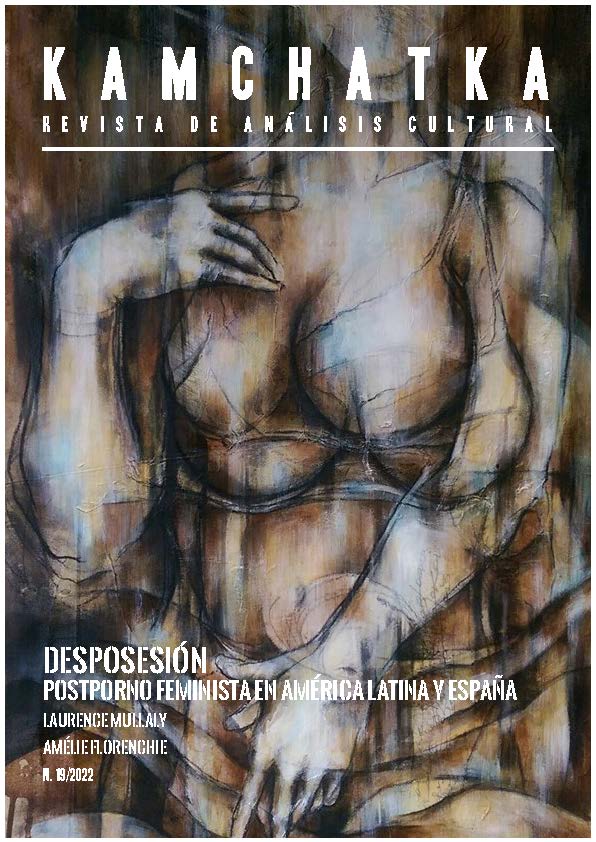The reverse side of the community: on borders and exclusion in 'PornoBurka' and 'Cabezas cortada's
DOI:
https://doi.org/10.7203/KAM.19.21759Keywords:
comunidad, inmunidad, exclusión, frontera, otredad Abstract
Abstract
Every community is based on an exclusion: the existence of an “us” in opposition to a “them”. The main purpose of this paper is to analyze the mechanism through which this exclusion is produced and officially presented. Taking Roberto Esposito’s immune paradigm as a basis we approach PornoBurka (2013), by Brigitte Vasallo, and Cabezas cortadas (2018), by Pablo Gutiérrez, to reveal: firstly, the identification of the other as a threat that could break the community normality and, secondly, the experience of becoming that threatening other. In our analysis it is fundamental to pay attention to the body because on its surface are inscribed the marks that, indelible as scars, separate the included from the excluded, the normal from the abnormal, the known from the unknown. Fear of conflict or contagion, but also of the loss of identity, values or work turn otherness into a threat from which it is necessary to protect oneself. For this reason, immune barriers are established, which codify and name what is different according to preconfigured representational frameworks, which must be either assimilated or rejected.
 Downloads
Downloads
 References
References
Ali, Zahra (2020). “Introducción”. Ali, Zahra (ed.). Feminismo e islam. Las luchas de las mujeres musulmanas contra el patriarcado. Madrid: Clave intelectual: 11-28.
Agamben, Giorgio (2006). Homo sacer. El poder soberano y la nuda vida I. Valencia: Pre-Textos.
Bardan, Margot (2020). “Feminismo islámico: ¿qué significa?”. Ali, Zahra (ed). Feminismo e islam. Las luchas de las mujeres musulmanas contra el patriarcado. Madrid: Clave intelectual: 49-62.
Barlas, Asma (2020). “Mujeres musulmanas y opresión: leer la liberación a partir del Corán”. Ali, Zahra (ed.). Feminismo e islam. Las luchas de las mujeres musulmanas contra el patriarcado. Madrid: Clave intelectual: 79-102.
Butler, Judith (2010). Marcos de guerra. Las vidas lloradas. Madrid: Paidós.
Derrida, Jacques (2014). Posiciones. Entrevistas con Henri Ronse, Julia Kristeva, Jean-Louis Houdebine y Guy Scarpetta. Valencia: Pre-Textos.
El Hachmi, Najat (2019). Siempre han hablado por nosotras. Barcelona: Destino.
Epps, Brad, Keja Valens y Bill Johnson González (2005). Passing Lines. Sexuality and Inmigration. Harvard University Press.
Esposito, Roberto (2005). Inmunitas. Protección y negación de la vida. Buenos Aires: Amorrortu.
Esposito, Roberto (2007). Communitas. Origen y destino de la comunidad. Buenos Aires: Amorrortu.
Esposito, Roberto (2011). Bíos. Biopolítica y filosofía. Buenos Aires: Amorrortu.
Esposito, Roberto. “Inmunidad, comunidad, biopolítica”. Las Torres de Lucca. Revista Internacional de Filosofía política 1 (2012a): págs. 101-114.
Esposito, Roberto (2012b). El dispositivo de la persona. Buenos Aires: Amorrortu.
Garcés, Marina (2013). Un mundo común. Barcelona: Bellaterra.
Gutiérrez, Pablo (2018). Cabezas cortadas. Barcelona: Seix Barral.
Hamido Yahia, Mimunt (2021). No nos taparán. Islam, velo, patriarcado. Madrid: Akal.
Khosravi, Shahram (2021). Yo soy frontera. Autoetnografía de un viajero ilegal. Barcelona: Virus Editorial.
Lamrabet, Asma (2020). “Entre el rechazo del esencialismo y la reforma radical del pensamiento musulmán”. Ali, Zahra (ed.). Feminismo e islam. Las luchas de las mujeres musulmanas contra el patriarcado. Madrid: Clave intelectual: 63-77.
Lévi-Strauss, Claude (1988). Tristes trópicos. Madrid: Paidós.
Mouffe, Chantal (1999). El retorno de lo político. Comunidad, ciudadanía, pluralismo, democracia radical. Madrid: Paidós.
Peris Blanes, Jaume. “Ficciones inmunitarias. Sobre la lógica de la inmunidad en la cultura contemporánea”. Papeles del CEIC. International Journal on Collective Identity Research 183 (2018): 1-32.
Rodríguez, Juan Carlos. “Literatura, moda y erotismo: el deseo (parte I)”. Revista Laberinto 18 (2005): 13-22.
Schmitt, Carl (1991). El concepto de lo político. Texto de 1932 con un prólogo y tres corolarios. Madrid: Alianza.
Vasallo, Brigitte (2013). PornoBurka. Desventuras del Raval y otras f(r)icciones contemporáneas. Cardedeu: Ediciones Cautivas.
Downloads
Published
How to Cite
-
Abstract1120
-
Artículo PDF (Español)777
Issue
Section
License
This journal provides an immediate free access to the content on the principle that freely make investigation available to the public, which promotes an increased global knowledge exchange.
Unless otherwise indicated, texts published in this journal are under the license Attribution-NonComercial 4.0 by Creative Commons. These texts may be copied, distributed and publicly communicated whenever the publication’s author and title are quoted and whenever they are not used for commercial purposes. In any case, intellectual property of the articles and its potential economic rights entirely belong to its authors.
The full license can be consulted on https://creativecommons.org/licenses/by-nc/4.0/. We encourage authors to disseminate papers published in Kamchatka. Journal of cultural analysis electronically, in institutional digital repository or in their websites.





